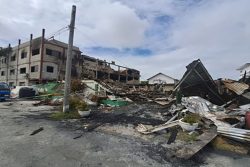Dear Editor,
After reading the Sunday Stabroek editor-ial captioned “Burnham and education” (October 21, 2007), I hope the same right to analysis given in this column will be given to mine.
What Burnham tried to do with the education system is most remarkable.
Admittedly some mistakes were made along the way, but no one can deny his intent was honourable. The issue of the colonial education system and privately owned schools, which I rather suspect the editorial feels comfortable with, loses sight of the fact that the colonial education was grounded in a system strongly British and by and large education was concentrated around the three Rs- reading, writing and arithmetic, and the proud recital of British nursery rhymes, pledges, songs, geography, money/ finance and history. This is an education no politically independent nation should want to continue.
Burnham’s education drive has to be judged based on his philosophy. He was committed to the new Guyana and the education of all persons to fit into such a role.
He looked around and recognised the importance of a learned society for the task ahead and the inherent deprivation and disparity to learning under and beyond the primary school level and offered opportunities to those who otherwise could not have had it. This meant that our educational system became the great equalizer in forging a new Guyana. Gone were the days when class, colour, race, religion, scholarship and finances were determinant factors to schooling.
It is also known that those who were exposed and went on to excel under the colonial private school system were those whose parents had money, won a scholarship or invested their money in the smart child or children. The community high school was built to educate those who were not at the time of secondary entrance examinations equipped with the passing score to enter a standard high school.
There was the Secondary School Proficiency Examination (SSPE) for those within the community high school who were considered late developers and given a second opportunity to go to high school. For the others it was meant to equip them with skills and knowledge befitting their given intellectual capabilities.
On the issue of mass games it was detested more for political grandstanding than what it really was meant to be and achieve. These very people who condemned mass games when they migrated to the so called developed countries would push and push their children to become cheerleaders of their school, which is a very competitive area to get into.
Burnham has been dead for twenty-two years it has taken quite a long time for the rot to step in, don’t you think. But many who were educated during the Burnham era have gone on to distinguish themselves at home and abroad. Correspondingly there are fewer persons who were educated from nursery to university in Guyana under the British system that can comparatively match or better the cadre who are now all over the world and were the recipients of Burnham’s education.
In the editorial haste to “diss” Burnham and by extension the PNC, it failed to even pay scant attention to the Secondary School Reform Project instituted under the Hoyte administration to address the shortcomings in the education system. It failed to pay attention to the very publicised mess at the University of Guyana. You have failed to examine the PPP administration’s education policy, and the problems Dr. Kenneth Hunte, SSRP project head had with executing the programme in accordance with its original mandate.
Then this quantum leap was made to compare Guyana and the world and you failed to analyse reports around the world. The editorial failed to compare what were the conditions, wealth and intelligence level of those at home who were allowed to succeed as against those who didn’t have the opportunity. You ignored the education reports coming out from other Caribbean countries and the USA questioning their respective school curricula and predicting a pending crisis if the authorities do not address the situation post haste.
Go online and read the stinging criticism from Caribbean scholars on the education crisis in the region, and USA top newspapers and Harvard academics et al on the failures of President Bush’s No Child Left Behind program. All these reports are pointing to the failure of respective authorities to grapple with falling education standards in their countries.
Yours faithfully,
Humphrey Charles







